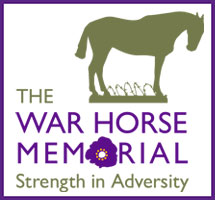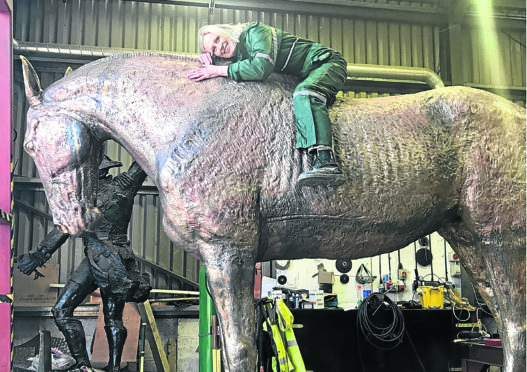War horse memorial to visit north of Scotland.
A national memorial to horses, mules and donkeys killed in battle is almost ready to head from the Highlands to its Berkshire home.
The Black Isle Bronze Foundry – based in Nairn – has crafted and cast a bronze WWI memorial and it is to visit Nairn and Inverness next week before heading south.
Working with The War Horse Memorial organisation and sculptor Susan Leyland, (pictured above) the foundry has constructed the first national memorial dedicated to the millions of UK, allied and commonwealth horses, mules and donkeys killed in battle.
Susan Osborne of The War Horse Memorial organisation said: “When looking for a foundry we went to see so many but the one in Nairn blew us away. The foundry have treated the project with the dignity and respect we felt it deserved and they have really taken it under their wing. They have worked well with the sculptor and we have had nothing but kindness from them – and from the people of Nairn”.
The memorial, which is to be officially unveiled in June 2018, will be sited at Ascot Racecourse.
Residents of Nairn and Inverness will get a sneak peek of the memorial as a thank you for their support over the duration of the memorial’s construction. The two outings, on Friday April 27 at the Black Isle Bronze Foundry and Saturday April 28 at Falcon Square in Inverness, are the only opportunity for the public to see the memorial before the official unveiling.
Horses were used in The Great War as a means of transporting ammunition and supplies often in the front line of battle. 8 million horses are believed to have been killed during the war, with countless donkeys and mules also succumbing to injuries or illness related to the poor conditions of the battlefield.
Artefacts from all corners of the UK related to WWI will be placed in authentic brass shells at the foot of the horse and were gathered yesterday in a special ceremony at the Garrison Church in Windsor. Of the 60 different items gathered were an authentic horse’s hoof from The Great War, barbed wire from The Somme and numerous buttons, coins and medals.
The above article first published on The Aberdeen Press and Journal.

